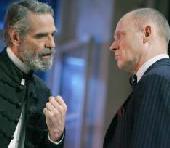SEARCH
REVIEWS
FEATURES
NEWS
Etcetera and
Short Term Listings
LISTINGS
Broadway
Off-Broadway
NYC Restaurants
BOOKS and CDs
OTHER PLACES
Berkshires
London
California
DC
Philadelphia
Elsewhere
QUOTES
On TKTS
PLAYWRIGHTS' ALBUMS
LETTERS TO EDITOR
FILM
LINKS
MISCELLANEOUS
Free Updates
Masthead
Writing for Us
A CurtainUp  London Review
London Review
 London Review
London ReviewEmbers
|
While I basked in sunshine, you chose to live in the shadows.
---- Henrik |

Jeremy Irons as Henrik and Patrick Malahide as Konrad
(Photo: Alastair Muir) |
Forty one years planning for this moment, now in his seventies, aristocrat and retired General, Henrik (Jeremy Irons) lives in the room in which he was born in his Hungarian castle, with only his ninety one year old wet nurse (Jean Boht) for company. It is now 1940 and Europe is on the brink of war. Forty years ago Henrik and Konrad (Patrick Malahide) parted company. Konrad left hurriedly, in Henrik's words, "like a thief in the night" taking with him the friendship that had been theirs since childhood. What was the reason for Konrad's flight? The triangle is completed by Henrik's young, beautiful and musically gifted wife, Krisztina, who died eight years after Konrad left, and who never again spoke to her husband. The subtext of Marai's novel is not the loss of the marriage but the pain of the loss of friendship between the two men.
As Konrad arrives, Henrik takes out a revolver and aims it out of the window in the direction of the courtyard. What actually explodes is four decades of untested supposition, surmise, musings, resentment, paranoia and conspiracy theories that Henrik has been brewing. It is a portrait of an obsessive mind. The first act is a bare thirty five minutes as, before dinner, the two men remind each other of their early history, their time as comrades in arms, their relative position in life. The men are products of a society long gone by 1940. Henrik has stayed in his country, remained with the military, even retired he wears a frog and braided frock coat that is as much a uniform as a suit. Konrad has been in the tropics, the traditional place of refuge for scoundrels, younger sons, the impecunious and those escaping the old order.
It is in the second act that, nicetiesare cast aside and the Jeremy Irons' character lists his accusations. Henrik becomes increasing agitated, his irritation showing in compulsive hand movements. Irons is waspish, his fidgetty hand gestures betraying tension. He is very, very angry. He chews his full beard and grinds his teeth. So much so that I was forced to ask if there was a homosexual agenda here or maybe just that men and masculine things were more important to Henrik than any woman. Malahide as Konrad spends much of the second act listening. He, and here the play takes a very interesting twist, chooses not to defend himself, nor to explain or apologise. Instead he says nothing and refuses to open Krisztina's diary and read it. In this game of blind poker, Henrik throws the diary on the fire without reading it. There is much talk about hunting and the hunted.
Peter J Davison's set is tall ceilinged and baronial, the room not at all homely but cold. There is no doubt that Embers is finely directed and acted but it didn't engage me as much as it might have done. I suspect that I might prefer the novel. Those values of honour and pride and militarism seem such a long time ago. How can I watch this play and not identify with the woman who was silent until she died at thirty and conclude that both men played their part in killing her? Krisztina needed to listen to the warning from Emperor Franz Joseph about the man she was about to marry, "In the forest where he is taking you there are bears. He is a bear too".
|
EMBERS
Written by Sandor Marai Dramatised by Christopher Hampton Directed by Michael Blakemore Starring: Jeremy Irons, Patrick Malahide With: Jean Boht Design: Peter J Davidson Lighting: Mark Henderson Sound: John Leonard Running time: One hour 45 minutes with one interval Box Office: 0870 060 6623 Booking to 27th May 2006 extended to 24th June. Reviewed by Lizzie Loveridge based on 3rd March 2006 performance at the Duke of York's Theatre, St Martin's Lane, London, WC2 (Tube: Leicester Square) |





